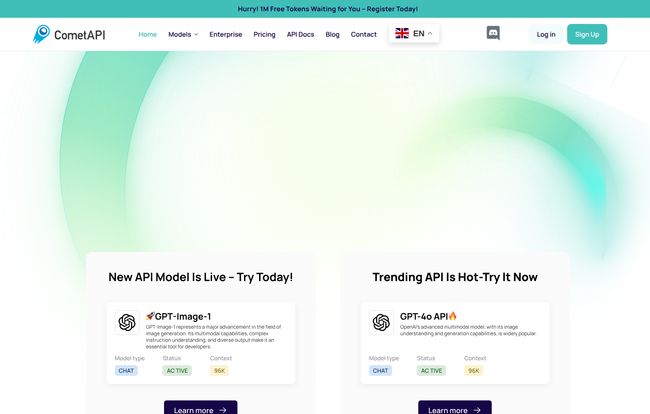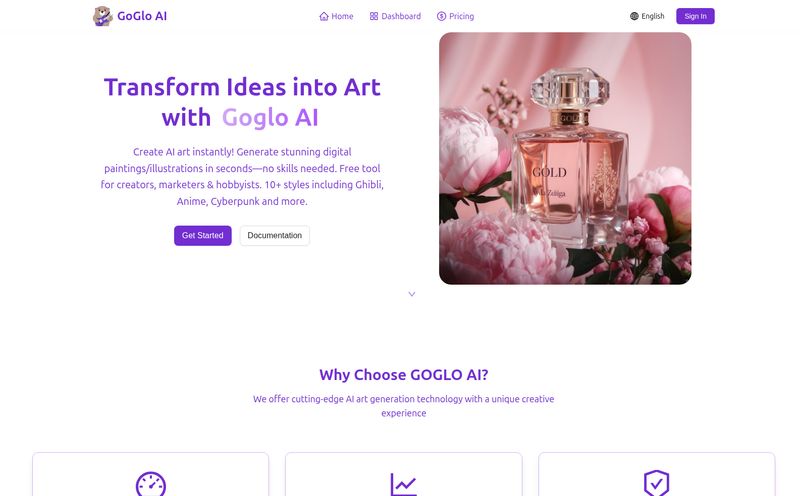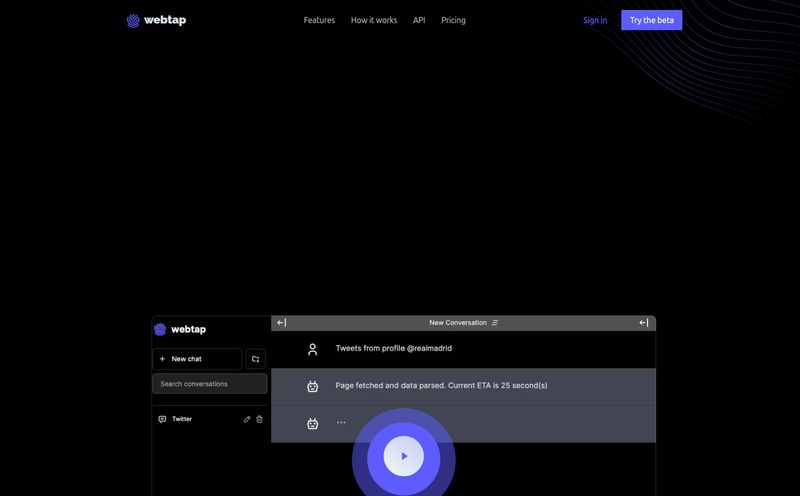If you're a developer, a startup founder, or even a tinkerer in the AI space, you know the feeling. One tab open for OpenAI's playground, another for Google's Gemini docs, a third for Grok, and don't even get me started on the half-dozen image and video model APIs you're trying to compare. It’s a mess of API keys, different billing cycles, and documentation styles that look like they were written on different planets. I've been there, and frankly, it's exhausting.
It feels like we're spending more time managing access to the tools than actually using them to build cool stuff. So when I stumbled upon a platform called CometAPI, which claims to be a “one-stop large-model API aggregation platform,” my curiosity was definitely piqued. Another platform, you say? But this one seemed different. It wasn't just promising a bunch of endpoints; it was talking about the entire API lifecycle. Now that got my attention.

Visit CometAPI
So, What Exactly is CometAPI?
Think of CometAPI as a central train station for today's hottest AI models. Instead of going to a dozen different little bus stops to catch a ride, you go to one main hub where all the lines connect. It aggregates APIs from leading AI providers, meaning you can access models like GPT-4o, Gemini 1.5 Flash, Suno for music, and even Midjourney for video all through a single, unified interface. This alone is a pretty big deal.
But calling it just an aggregator is selling it short. From what I’ve seen, it's positioning itself as a complete developer toolkit. It's built for R&D teams who follow an API Design-first approach, offering tools for designing, debugging, testing, and mocking APIs. It’s less of a simple reseller and more of a workbench for anyone serious about building with AI.
Why API Aggregation is a Game-Changer Right Now
The AI model landscape is moving at a breakneck pace. One week, a new version of a text model drops and blows everything else out of the water. The next, a new video generation model appears that was science fiction just a year ago. For developers, this creates a serious problem: how do you stay agile? How do you test and swap out models without a complete re-architecture of your application every single month?
This is where an aggregator shines. By building your app on top of a platform like CometAPI, you abstract away the specific provider. Want to see if Grok-1 gives a better response for your chatbot than Qwen2? With a traditional setup, that's a whole new integration project. With an aggregator, it can be as simple as changing an endpoint parameter. It turns experimentation from a week-long headache into a five-minute task. That's not just convenient; it's a strategic advantage.
A Look at CometAPI's Standout Features
Alright, let's get into the nuts and bolts. What makes this platform more than just a menu of APIs?
The Main Course: A Buffet of AI Models
First and foremost, the selection is impressive. Looking at their dashboard, you see the big names right away. Text, code, image, and video models are all there. Seeing things like Suno Music API and a Midjourney Video API next to mainstays like GPT-4o shows they're aiming for breadth. The ability to have one point of contact for such a diverse set of tools is the primary draw, and for many, that alone might be worth the price of admission.
The Secret Sauce: A Full Developer Toolkit
This is where CometAPI surprised me. They’ve bundled in tools that address the entire development process. There's a powerful visual editor for designing and debugging your API calls. It supports JSON Schema, which is a huge plus for ensuring your data structures are correct right from the start. No more 'guess and check' with your API calls. And it doesn't stop at design. They've built-in automated testing tools that can generate tests directly from your API specifications. This includes visual assertions and response validation, which can be a life saver for catching regressions before they hit production. It even hooks into your CI/CD pipeline. This is serious stuff, the kind of thing you usually have to stitch together from three or four different services like Postman, Swagger, and a separate testing framework.
Mock Servers That Actually Work
One of the most tedious parts of development is waiting on a finished backend or dealing with a live API that costs money for every test call. CometAPI offers a mock engine—both local and in the cloud—that generates realistic mock data based on your API's schema. This means your frontend team can build against a functional, predictable API endpoint without the backend even being live yet. It’s a huge accelerator for parallel development workflows.
What About the Cost? The Freemium Approach
Now for the big question: what’s this going to set me back? According to their site, CometAPI operates on a freemium, pay-as-you-go model. I love this. It means you can get your feet wet, integrate the platform, and run some tests without having to pull out a credit card or commit to a hefty monthly subscription. This lowers the barrier to entry to basically zero.
The pay-as-you-go aspect is perfect for a tool like this. It scales with your usage. Small project? Small bill. Your app goes viral overnight? You can handle the load, and your costs will reflect that success. I couldn't find a dedicated, detailed pricing page with specific rates per model, which is a small point of friction. I'd imagine the costs are passed through from the original API providers with a small platform fee on top, but I'd love to see that broken down more clearly. Still, for getting started, 'free' is a pretty good price.
Who Should Give CometAPI a Shot?
I can see a few groups really getting a lot out of this:
- Startups and Indie Hackers: The speed and agility you gain from swapping models easily is invaluable when you're trying to find product-market fit. The freemium model makes it a no-brainer.
- R&D and Prototyping Teams: For teams inside larger companies tasked with exploring what's possible with AI, this is a dream. It gives them a sandbox to test nearly every major model without the procurement red tape of setting up individual accounts for each one.
- API-First Development Shops: Any team that already lives and breathes the API-first methodology will see the value immediately. The design, mocking, and testing tools slot right into their existing workflow.
A Few Final Thoughts and Considerations
No tool is perfect for everyone. While the all-in-one approach is fantastic, some power users might miss the granular control or specific, niche features of a direct integration with a provider like OpenAI. Also, as with any middleman service, you're placing your trust in their platform's reliability and security. Given it's a tool for developers, I'm sure they take this seriously, but it's always something to consider.
But honestly, for the vast majority of use cases, the benefits of simplification, speed, and having a full development suite in one place seem to heavily outweigh any potential downsides. It solves a very real, very annoying problem that is only getting worse as more and more AI models flood the market.
My final verdict? CometAPI looks like an incredibly promising tool. It’s a well-thought-out solution that goes beyond simple aggregation and provides genuine, workflow-enhancing features for developers. If you're tired of the API chaos, you should definitely give it a try. The freemium model means you have absolutely nothing to lose.
Frequently Asked Questions
What is CometAPI in simple terms?
CometAPI is a platform that brings together many different AI model APIs (like those for text, images, and video) into one place. It also includes tools to help developers design, test, and manage those APIs more easily.
Is CometAPI free to use?
It has a freemium model. This means there's a free tier to get started and test things out. For heavier usage, it switches to a pay-as-you-go system, where you only pay for the API calls you actually make.
What is the main benefit of using CometAPI?
The biggest benefit is simplification and speed. Instead of managing multiple accounts, API keys, and billing with different AI companies, you do it all through CometAPI. This makes it much faster to test and switch between different AI models in your applications.
What kind of APIs can I find on CometAPI?
You can find a wide range of APIs for large language models. This includes popular text models like GPT-4o and Gemini, code generation models, music creation APIs like Suno, and even video and image generation APIs from providers like Midjourney.
Is CometAPI just for large companies?
Not at all. It's designed for everyone from individual developers and small startups to large R&D teams. The pay-as-you-go pricing makes it accessible for projects of any size.
Does CometAPI offer more than just API access?
Yes, and that's a key part of its offering. It provides a full suite of tools for the API lifecycle, including a visual API designer, an automated testing tool, and a mock server for development.
References and Sources
- I based my analysis on the public-facing website and feature descriptions provided by CometAPI.
- For more on the philosophy behind some of the platform's tools, I recommend reading up on API Design-First development.



